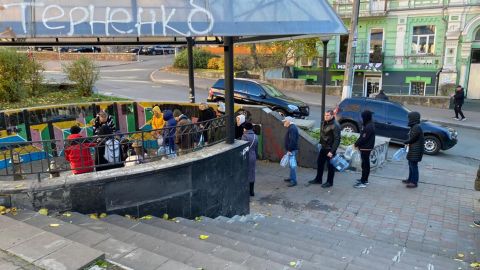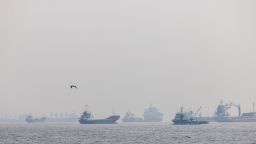The Russian missiles being fired at Ukraine's civilian infrastructure are damaging, but air defense accuracy is improving, especially with the German Iris-T systems which have hit everything they've targeted.
More of those have been promised by Germany to Ukraine. JL
Kostan Nechyporenko and colleagues report in CNN:
Ukraine’s air force said Russia had launched more than 50 cruise missiles into Ukraine on Monday, and said it had intercepted 44 of them. 10 Russian missiles were shot down over Kyiv. So far Germany has supplied Ukraine with one IRIS-T. “This system worked with a 100% result.” Monday’s missiles were launched from Soviet-era Tupolev Tu-95 and Tu-160 bombers that took off from Russia’s Rostov region and over the Caspian Sea. "Such terrorist actions targeting water and electricity supply do not scare people anymore. We can handle this."Russia launched a barrage of missile strikes at Ukrainian cities on Monday as it ramped up its attacks on infrastructure facilities across the country.
Explosions and air raid sirens were heard in Kyiv early on Monday and 80% of residents were left without water – with many losing electricity, too – following power outages caused by Russian strikes, the capital’s mayor, Vitali Klitschko, said on Telegram.
One of the strikes hit an energy facility that powered 350,000 apartments in the capital, Klitschko said, adding that emergency services were attempting to restore power and “stabilize the situation as soon as possible.”
Attacks on critical infrastructure in the central regions of Cherkasy and Kirovohrad, the eastern region of Kharkiv, and the southern region of Zaphorizhzhia were also reported.
By Monday afternoon, power was still partially out for many – though it had been restored to some.
“Power engineers plan to stabilize the situation with the electricity supply at about 9-10 pm.” Klitschko said on Telegram, adding: “But even after the resumption of electricity supply, power cuts will still be applied. Because the situation is difficult.”
The wave of strikes came after Russia accused Ukraine of attacking the city of Sevastopol in Crimea over the weekend. Russia illegally annexed the Ukrainian peninsula in 2014 and has controlled the territory since then.
Earlier, Klitschko urged residents of the capital to stock up on water from shops and pumping stations after an attack on a nearby power facility.
“Currently, due to damage to the energy facility near Kyiv, 80% of the capital’s consumers remain without water supply,” he said on Telegram. “Just in case, we ask you to stock up on water from the nearest pumps and points of sale. Specialists are doing everything possible to return water to the apartments of Kyiv residents.”
Speaking to CNN on the ground in Kyiv, 31-year-old Yana Lysenko said: “Monday morning has started horribly as usual. I have a 4-year-old child, so of course I feel stressed.
“We don’t have water right now, but we do have electricity. We hope that the services will restore everything very quickly. Our spirit is very high, and we are waiting for victory. Such terrorist actions targeting water and electricity supply, I believe, do not scare people anymore.”
Viktor Halashan, aged 70, told CNN he is remaining positive despite having no water supply.
“Not having water is fine, we can handle this,” he said, adding that he hopes Ukraine’s “troops will get us closer to victory soon.”
Local office worker Oleksandr Nechepuriak told CNN he was collecting water for 15 people.
“It’s important to get (the)office running,” said Nechepuriak, who works in food production.
“We will handle this,” he said, adding that there are “no other options.”
Homes in Kharkiv also without water
Ukraine’s energy minister, Herman Halushchenko, described the attacks as “barbaric,” saying on Facebook: “Electric substations, hydropower and heat generation facilities were hit by rocket fire.”
He added: “As a result of this massive attack, there was a partial blackout and emergency power outage schedules were introduced for consumers in Kyiv, Cherkasy (and) Zaporizhzhia, and Cherkasy, Kyiv, Kirovohrad, Kharkiv, Zaporizhzhia, (and) Poltava regions.”
The water supply in Kharkiv – Ukraine’s second-largest city – was also affected after an infrastructure facility was hit, while most subway train services were halted, mayor Ihor Terekhov said on Telegram.
“The blow fell on a critical infrastructure facility, resulting in the subway and ground electric transport being de-energized,” he said. “At the moment, we have managed to launch the Kholodnohirsko-Zavodska (subway) line, and we have replaced trolleybuses and trams with buses.”
Terekhov said engineers were “doing everything possible to resume water supply to the homes of Kharkiv residents as soon as possible.”
Two missiles hit Kharkiv on Monday morning, the mayor had previously said on Telegram.
And in the central city of Kryvyi Rih, one missile hit an industrial enterprise, mayor Oleksandr Vilkul said on Telegram.
“During the morning missile attack, two missiles were shot down (thanks to the Air Defense Forces), and one cruise missile hit an industrial enterprise,” he said. There were no casualties reported.
Monday’s strikes hit 10 regions and damaged 18 facilities, Ukrainian Prime Minister Denys Shmyhal said on Telegram.
“Their target was not military facilities, but civilian critical infrastructure,” Shmyhal said. “Missiles and drones hit 10 regions, where 18 facilities were damaged, most of them energy-related.”
He said “hundreds of settlements in seven regions” had lost power and engineers were “working at full capacity” to repair the damage.
Ukraine’s air force said Russia had launched more than 50 cruise missiles into Ukraine on Monday, and said it had intercepted 44 of them.
“At 7:00 a.m. on October 31, the Russian occupiers launched several waves of missile attacks on critical infrastructure facilities in Ukraine,” the Air Force Command of the Armed Forces of Ukraine said.
“More than 50 X-101/X-555 cruise missiles were launched from the Tu-95/Tu-160 strategic aviation missile-carrying aircraft north of the Caspian Sea and the Volgodonsk region (Rostov region). 44 cruise missiles were destroyed” by the Ukrainian military, the air force statement added.
At least 10 Russian missiles were shot down over Kyiv early on Monday, regional police chief Andrii Nebytov said on Telegram.
“The police of the Kyiv region are now discovering debris from downed rockets of the occupiers in various areas of the region,” he said. “Air defense forces shot down at least 10 enemy missiles.”
Oleksii Kuleba, head of Kyiv region military administration, said the strikes “hit critical infrastructure targets” and two people had been injured, one seriously.
Monday’s missiles were launched from Soviet-era Tupolev Tu-95 and Tu-160 bombers that took off from Russia’s Rostov region and over the Caspian Sea, a spokesman for the Ukrainian Air Force Command said on television.
Yurii Ihnat said there had been “several waves of missile launches” and repeated the claim that Ukraine had shot down “a really high percentage.”
Ihnat also appealed for more US and German air defenses in the wake of the attacks.
“We need air defense. Those systems that we have already mentioned, the (German-made) IRIS-T, we need more of them,” he said.So far Germany has supplied Ukraine with one IRIS-T.
“This system works and it worked today, and worked with a 100% result,” Ihnat said. “And we want the Germans to increase production.”
He also mentioned the US-made NASAMS system, which is due to be delivered, and older systems such as the US-made HAWK ground-to-air missile.
Moscow defended the attacks. The Russian Defense Ministry said on Telegram Monday that it had targeted Ukraine’s “military command and energy systems.”
“The Armed Forces of the Russian Federation continued strikes with high-precision, long-range air and sea-based weapons against Ukraine’s military command and energy systems,” it said. “All assigned objects have been hit.”























0 comments:
Post a Comment